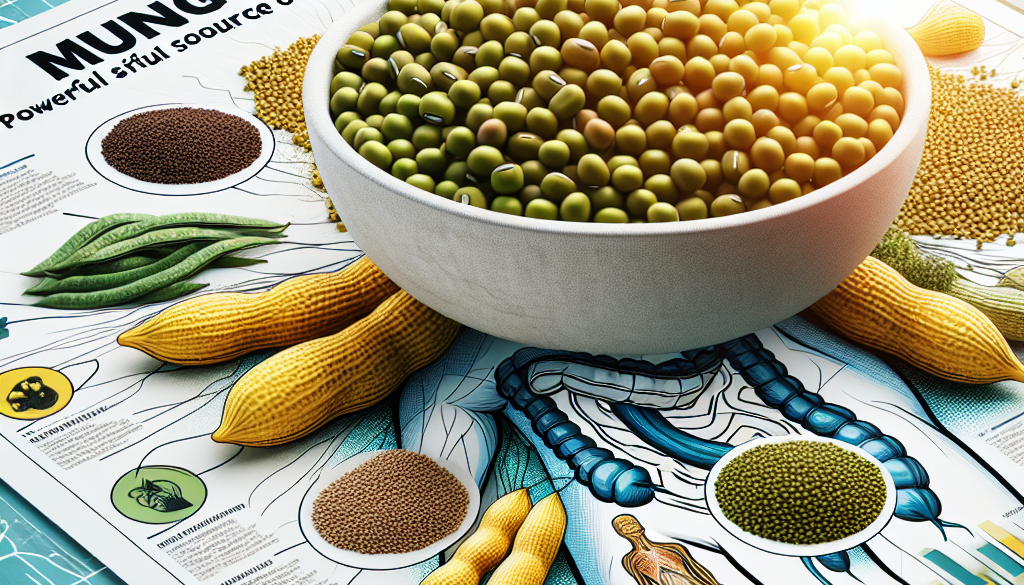Digestive Health: Mung Beans as a Fiber Source
-
Table of Contents
- Mung Beans: A Superb Fiber Source for Digestive Health
- Understanding Fiber and Its Importance
- The Nutritional Profile of Mung Beans
- Mung Beans and Digestive Health
- Incorporating Mung Beans into Your Diet
- Case Studies and Research on Mung Beans and Digestive Health
- Statistics: Fiber Intake and Public Health
- Conclusion: Embrace Mung Beans for Digestive Wellness
- Discover ETprotein’s Mung Bean Protein Products
Mung Beans: A Superb Fiber Source for Digestive Health
Digestive health is a cornerstone of overall well-being. It’s the engine room of the human body, processing the food we eat, extracting nutrients, and eliminating waste. A diet rich in fiber is widely recognized as essential for maintaining a healthy digestive system. Among the plethora of fiber sources available, mung beans stand out as a nutritional powerhouse. In this article, we delve into the benefits of mung beans as a fiber source and how they contribute to digestive health.
Understanding Fiber and Its Importance
Fiber is a type of carbohydrate that the body cannot digest. It passes through the digestive system, helping to regulate the body’s use of sugars, keeping hunger and blood sugar in check. There are two types of dietary fiber – soluble and insoluble. Both are important for health, digestion, and preventing diseases.
- Soluble fiber dissolves in water to form a gel-like material. It can help lower blood cholesterol and glucose levels.
- Insoluble fiber promotes the movement of material through the digestive system and increases stool bulk, beneficial to those with constipation or irregular stools.
A diet rich in fiber can help prevent heart disease, diabetes, weight gain, some cancers, and can also improve digestive health.
The Nutritional Profile of Mung Beans
Mung beans, a staple in Asian cuisines, are small, green legumes that are packed with nutrients. They are an excellent source of protein, essential amino acids, vitamins, and minerals. Most importantly, mung beans are an outstanding source of dietary fiber.
- Rich in protein: Mung beans provide about 14 grams of protein per cooked cup (202 grams), making them a fantastic plant-based protein source.
- High in fiber: With about 15 grams of fiber per cooked cup, mung beans are an excellent way to meet your daily fiber needs.
- Loaded with vitamins and minerals: They are a good source of potassium, magnesium, folate, copper, zinc, and various B vitamins.
These nutrients contribute to the overall health benefits of mung beans, particularly their role in supporting digestive health.
Mung Beans and Digestive Health
The high fiber content in mung beans is particularly beneficial for the digestive system. Here’s how mung beans can improve digestive health:
- Preventing Constipation: The insoluble fiber in mung beans adds bulk to the stool, which promotes regular bowel movements and prevents constipation.
- Lowering Cholesterol: The soluble fiber in mung beans can help lower total blood cholesterol levels by lowering low-density lipoprotein (LDL) or “bad” cholesterol levels.
- Regulating Blood Sugar Levels: The fiber in mung beans helps slow down the absorption of sugar in the bloodstream, preventing spikes in blood glucose levels.
- Supporting Gut Health: Mung beans contain prebiotic fiber, which feeds the beneficial bacteria in the gut. A healthy gut flora is essential for a well-functioning digestive system.
Regular consumption of mung beans can contribute to a balanced diet and help maintain a healthy digestive tract.
Incorporating Mung Beans into Your Diet
There are many ways to include mung beans in your diet. They can be enjoyed cooked, sprouted, or ground into flour. Here are some ideas:
- As a main dish: Cooked mung beans can be used in curries, soups, and stews.
- As a salad ingredient: Sprouted mung beans add a crunchy texture to salads.
- In baking: Mung bean flour can be used to make pancakes, crepes, or used as a thickener in sauces.
- As a snack: Roasted mung beans make a crunchy, nutritious snack.
With their mild flavor, mung beans can easily be incorporated into a variety of dishes, making them a versatile addition to any meal.
Case Studies and Research on Mung Beans and Digestive Health
Several studies have highlighted the benefits of mung beans for digestive health. For instance, research has shown that incorporating mung beans into the diet can improve bowel function and reduce symptoms of constipation. Additionally, the prebiotic properties of mung beans have been linked to improved gut health and a reduced risk of gastrointestinal diseases.
One study published in the “Journal of Food Science and Technology” found that rats fed with mung bean diets showed improved intestinal health and increased levels of beneficial gut bacteria. Another study in the “British Journal of Nutrition” reported that mung bean intake was associated with lower risks of colorectal cancer.
Statistics: Fiber Intake and Public Health
Despite the known benefits of fiber, many people do not consume enough in their daily diet. According to the American Heart Association, the average adult should aim for a dietary fiber intake of 25 to 30 grams a day from food, but the average intake among adults in the United States is only about 15 grams a day.
Increasing the consumption of fiber-rich foods like mung beans can help bridge this gap and contribute to better digestive health and overall wellness.
Conclusion: Embrace Mung Beans for Digestive Wellness
Mung beans are a nutritional gem, especially when it comes to fiber content. Their role in promoting digestive health is supported by a growing body of research. By incorporating mung beans into your diet, you can take advantage of their health benefits and contribute to your daily fiber intake. Whether you choose to enjoy them cooked, sprouted, or as flour, mung beans are a versatile and delicious way to boost your digestive health.
Discover ETprotein’s Mung Bean Protein Products
If you’re looking to incorporate mung bean protein into your diet, ETprotein offers a range of high-quality protein products. Their mung bean protein is an excellent choice for those seeking a plant-based protein source that supports digestive health.
ETprotein’s products are characterized by their neutral taste and non-GMO, allergen-free attributes, making them suitable for a variety of applications. Whether you’re a food manufacturer, a health enthusiast, or simply looking to improve your digestive health, ETprotein’s mung bean protein is an excellent choice.
About ETprotein:
ETprotein, a reputable protein Chinese factory manufacturer and supplier, is renowned for producing, stocking, exporting, and delivering the highest quality organic bulk vegan protein and plant proteins. They include Organic rice protein, clear rice protein, pea protein, clear pea protein, pumpkin seed protein, sunflower seed protein, mung bean protein, etc. Their offerings, characterized by a neutral taste, non-GMO, allergen-free attributes, cater to a diverse range of industries. They serve nutraceutical, pharmaceutical, cosmeceutical, veterinary, as well as food and beverage finished product distributors, traders, and manufacturers across Europe, USA, Canada, Australia, Thailand, Japan, Korea, Brazil, and Chile, among others.
ETprotein specialization includes exporting and delivering tailor-made protein powder and finished nutritional supplements. Their extensive product range covers sectors like Food and Beverage, Sports Nutrition, Weight Management, Dietary Supplements, Health and Wellness Products, and Infant Formula, ensuring comprehensive solutions to meet all your protein needs.
As a trusted company by leading global food and beverage brands and Fortune 500 companies, ETprotein reinforces China’s reputation in the global arena. For more information or to sample their products, please contact them and email sales(at)ETprotein.com today.












